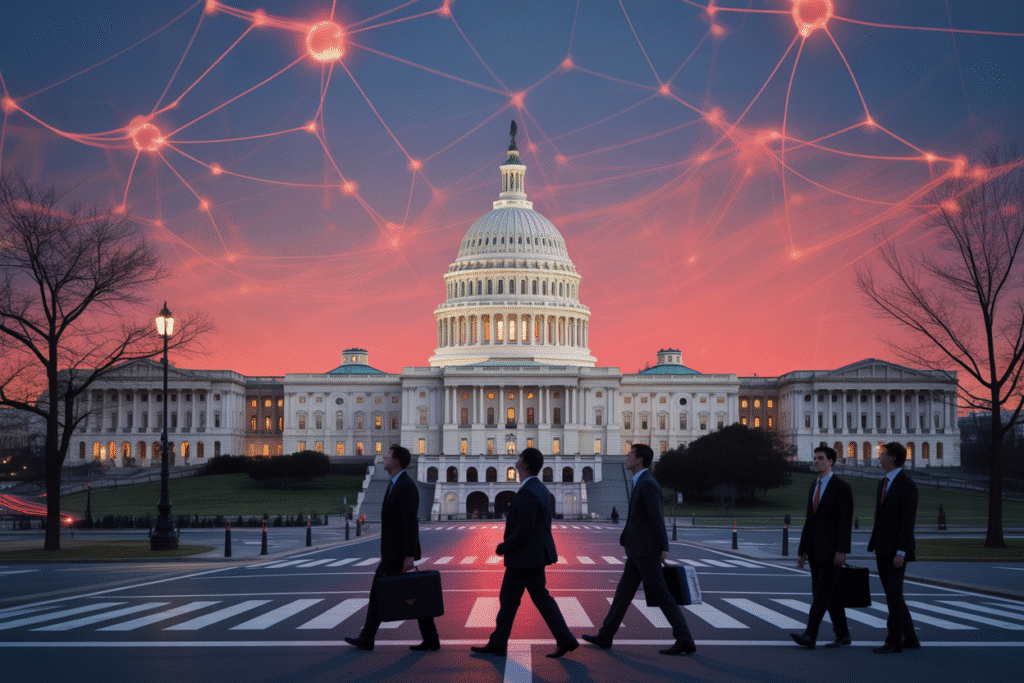AI politics just got personal—artists, coders, and voters are clashing over who controls the future.
AI politics isn’t tomorrow’s problem—it’s today’s Twitter war. Over the past 72 hours, four explosive debates have hijacked feeds, pitting artists against algorithms, reporters against hallucinations, and workers against the bots eyeing their paychecks. Buckle up; we’re diving into the fights reshaping your digital future.
The AI Ethics Firestorm Everyone’s Talking About
AI politics is no longer a niche topic whispered in tech circles. From Capitol Hill hearings to your TikTok feed, the debate over AI ethics, risks, and regulation is exploding. This week alone, artists, researchers, and policy wonks have flooded social media with fiery takes on everything from stolen art to job-stealing algorithms.
Why the sudden surge? Simple: the tools are getting better, faster, and more intrusive. When a single prompt can generate a Pixar-level animation or draft a legal brief, people start asking who gets credit, who gets paid, and who gets left behind. The stakes feel personal, and that makes for viral gold.
Below, we unpack the four hottest threads lighting up AI politics right now. Expect real quotes, real fears, and a few glimmers of hope.
Art vs Algorithm: Who Owns the Canvas?
Scroll through X this morning and you’ll see digital artists practically screaming into the void. Their gripe? Generative AI models trained on mountains of copyrighted artwork without consent, credit, or compensation. One animator put it bluntly: “It’s like someone photocopied my sketchbook, slapped their name on it, and sold prints at Comic-Con.”
The environmental angle adds fuel. Training a single large model can guzzle as much electricity as a small town uses in a year. Data centers, meanwhile, are draining local water supplies to cool overheated chips. Suddenly, that cute AI-generated cat video feels less adorable.
But defenders push back hard. They argue AI democratizes creativity, letting indie filmmakers storyboard scenes they could never afford. The counter? “Democratization” rings hollow when the original creators can’t pay rent. Expect this tug-of-war to dominate AI politics headlines for months.
Key flashpoints to watch:
• Lawsuits from major studios against AI companies for copyright infringement
• Proposed legislation requiring disclosure of training data sources
• Grassroots campaigns pushing “human-made” labels on streaming platforms
• Tech giants pledging carbon offsets that critics call greenwashing
The bottom line: the art world is drawing a line in the sand, and Silicon Valley is racing to redraw it.
Truth Decay: Can We Trust What AI Tells Us?
If you think AI hallucinations are just quirky glitches, talk to a journalist who cited a fake source generated by ChatGPT. One reporter told me she nearly published a story quoting a nonexistent study before a fact-checker caught it. Multiply that by thousands of newsrooms, and you’ve got an information crisis.
Researchers are scrambling for fixes. Some propose blockchain-based verification networks where multiple validators confirm every AI output. Others want watermarking systems that flag synthetic text the way Photoshop labels edited images. The catch? These tools only work if platforms adopt them voluntarily.
Meanwhile, policymakers are circling. The EU’s AI Act demands “high-risk” systems prove accuracy before deployment. In the U.S., a bipartisan bill would require federal agencies to audit AI tools for bias. Tech lobbyists argue red tape will stifle innovation; civil rights groups say unchecked AI will stifle democracy.
The real fear isn’t just bad data—it’s concentrated power. When a handful of companies control the models that shape search results, loan approvals, and even prison sentencing, who holds them accountable? The answer may determine whether AI politics becomes a footnote or a constitutional crisis.
What you can do today:
1. Ask your favorite news outlet if they disclose AI use in reporting
2. Support open-source verification projects like Mira or Proof
3. Push local reps to back transparency bills (check congress.gov for current proposals)
4. Treat viral AI screenshots with the same skepticism you’d give a deepfake video
The stakes? Nothing less than the credibility of every fact you read online.
Jobs on the Chopping Block: Who Gets a Safety Net?
Remember when ATMs were supposed to kill bank teller jobs? Instead, banks hired more people to handle complex tasks. AI optimists love that story. Critics counter with a darker version: this time, the machines aren’t just moving cash—they’re writing code, diagnosing illness, and negotiating contracts.
VentureBeat recently spotlighted “managed displacement,” a euphemism for quietly redesigning roles until humans become optional. Picture a marketing analyst whose dashboard now auto-generates reports, leaving her to “review” work she used to create. The title stays the same; the paycheck doesn’t.
Healthcare offers a chilling preview. AI radiology tools flag tumors faster than any human, but hospitals are cutting radiologist hours rather than expanding early-detection programs. Patients win on speed; doctors lose on income. The same script is playing out in finance, law, and customer service.
Policy responses range from utopian to dystopian. Andrew Yang’s “Freedom Dividend” crowd wants universal basic income funded by AI taxes. Unions demand retraining programs with teeth—think coding bootcamps plus guaranteed placement. Tech CEOs? They’re floating four-day workweeks as a pacifier while quietly automating the fifth day away.
The wildcard is public backlash. When Hollywood writers struck last year, AI script generation was a core issue. The studios blinked first, agreeing to limit AI use in writers’ rooms. If similar fights erupt in healthcare or finance, AI politics could shift from conference panels to picket lines.
Watch these signals:
• Union contracts adding “AI transparency” clauses
• Cities piloting robot taxes to fund displaced-worker stipends
• Startups offering “human-only” certification for products
• Voter referendums on data dividends (Alaska’s oil fund, but for your data)
The future of work isn’t pre-written. It’s being negotiated in boardrooms, courtrooms, and comment sections right now. Your voice—yes, yours—can tilt the outcome.


